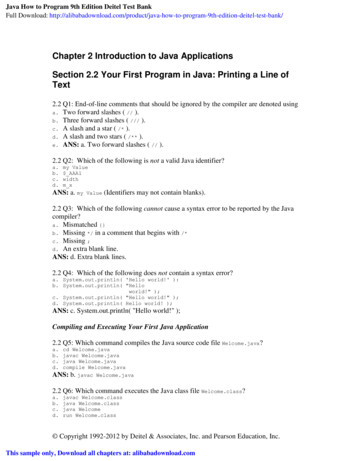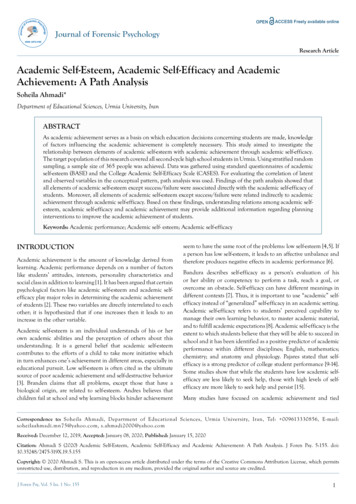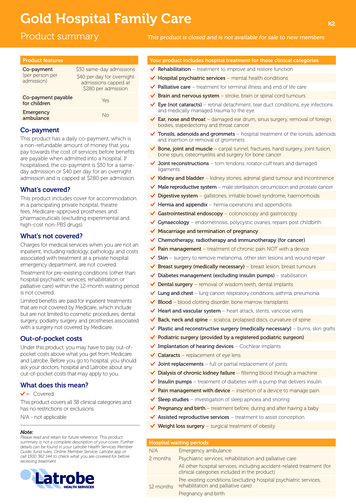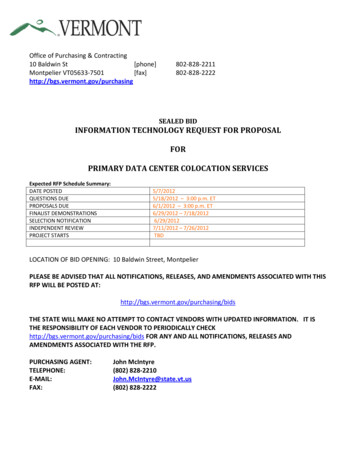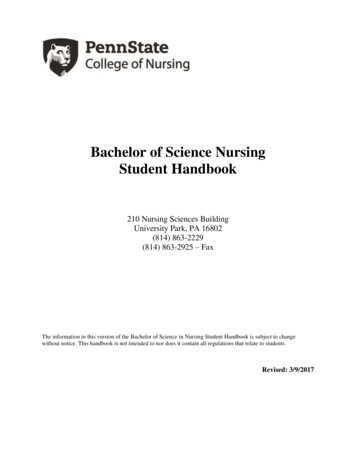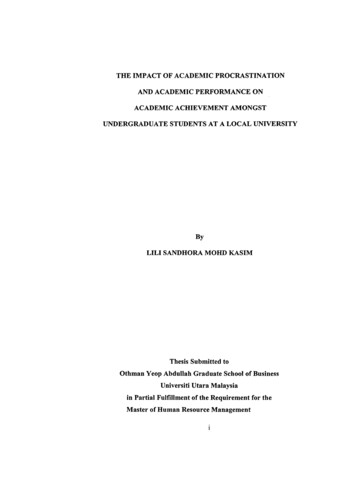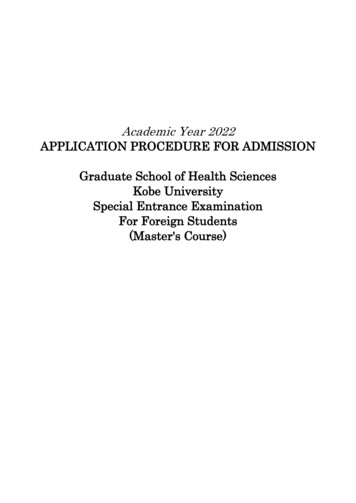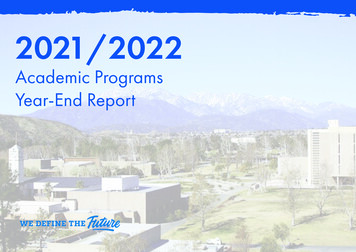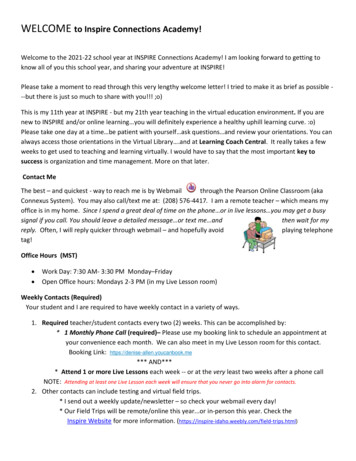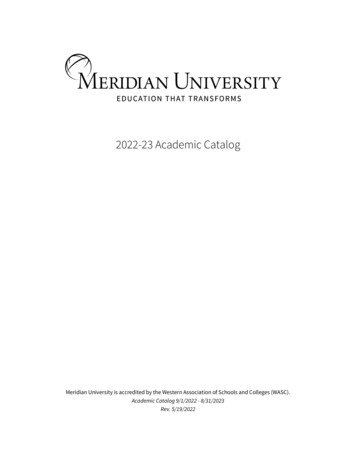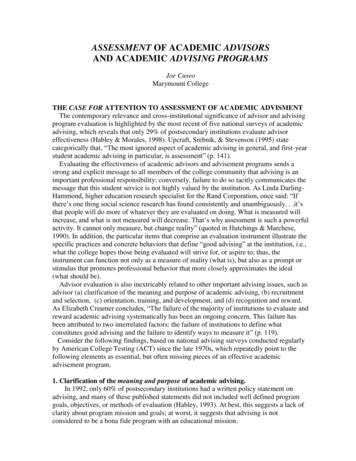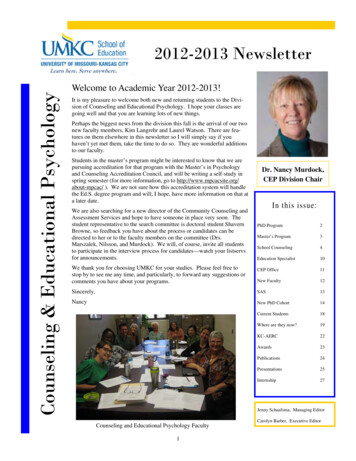
Transcription
2012-2013 NewsletterCounseling & Educational PsychologyLearn here. Serve anywhere.Welcome to Academic Year 2012-2013!It is my pleasure to welcome both new and returning students to the Division of Counseling and Educational Psychology. I hope your classes aregoing well and that you are learning lots of new things.Perhaps the biggest news from the division this fall is the arrival of our twonew faculty members, Kim Langrehr and Laurel Watson. There are features on them elsewhere in this newsletter so I will simply say if youhaven’t yet met them, take the time to do so. They are wonderful additionsto our faculty.Students in the master’s program might be interested to know that we arepursuing accreditation for that program with the Master’s in Psychologyand Counseling Accreditation Council, and will be writing a self-study inspring semester (for more information, go to http://www.mpcacsite.org/about-mpcac/ ). We are not sure how this accreditation system will handlethe Ed.S. degree program and will, I hope, have more information on that ata later date.We are also searching for a new director of the Community Counseling andAssessment Services and hope to have someone in place very soon. Thestudent representative to the search committee is doctoral student ShavernBrowne, so feedback you have about the process or candidates can bedirected to her or to the faculty members on the committee (Drs.Marszalek, Nilsson, and Murdock). We will, of course, invite all studentsto participate in the interview process for candidates—watch your listservsfor announcements.Dr. Nancy Murdock,CEP Division ChairIn this issue:PhD Program2Master’s Program3School Counseling4Education Specialist10We thank you for choosing UMKC for your studies. Please feel free tostop by to see me any time, and particularly, to forward any suggestions orcomments you have about your programs.CEP Office11New Faculty12Sincerely,SAS13NancyNew PhD Cohort14Current Students18Where are they 25Internship27Jenny Schaafsma, Managing EditorCounseling and Educational Psychology Faculty1Carolyn Barber, Executive Editor
PhD Program UpdateGreetings!A new academic year has begun in the counseling psychology program! It started with anexciting convention at APA in Orlando, Florida, with a great turnout of UMKC studentsand faculty. Many students and faculty alike presented their scholarly work and research;others just came to experience their first APA convention! In Orlando, we also had ourannual students-and -faculty dinner, this year organized by Katie Jorgenson (thanks!). Itwas a lively evening; please see the photo.After APA, the excitement continued with the beginning of a new semester and new people joining our faculty and student body. Our new faculty, Drs. Kim Langrehr and LaurelWatson, landed at UMKC running. They have already set up their research teams, withmany new and “old” students working with them. Seven new students, representing SouthKorea and India as well as different regions of the United States, also joined our programthis fall. Let me extend a warm welcome to: Soo Whan Choi, Matt Anderson, MichelleFarrell, Richa Khanna, Jessica Marshik, Joanna Maung, and Jennifer Schaafsma.While new people joined our program, others left. Nick Debernardi, Danah Barazanji,April Connery, and Barbara Fritts all graduated and began their new lives, with both newjobs and additions to their families, in Michigan, Iowa, New York, and Utah. Congratulations! Other students left for their pre-doctoral internship: Sean Comeau, Makini King,Julie Kohlhart, Romana Krycak, and Young Song. We miss you and wish you an inspirational and rewarding internship year.Dr. Johanna NilssonTraining DirectorI also would like to highlight the success of several of our graduates. For example, Drs. Tawny Hiatt and EmilyRussell-Slife now serve as new training directors at the counseling centers of University of Denver and Universityof Nevada, Las Vegas. Dr. Christa Schmidt is the program coordinator of the MA program of Counseling Psychology at Towson University, and Dr. Carissa Klevens is a newly appointed Director of Opioid Treatment Program &Addictive Behaviors Clinic at V.A. Los Angeles Ambulatory Care Center. Highlighted in this newsletter is Dr.Keisha Love, who was just appointed as the Department Chair of the Department of Educational, School, andCounseling Psychology at the University of Kentucky. Drs. Codi Schale and Ellie Olson also share updates aboutthemselves.Maybe it is a given, but we, the faculty, do feel very proud of these alumni’s accomplishments! We also knowmany other graduates are doing important and wonderful work in the United States and around the world. Keep intouch with us, we love hearing from you – learning about what you do is not only rewarding but also nurture thoseold teaching hearts of ours.Best Wishes & Happy Holidays!Third Annual APA Faculty and Student DinnerSAS Thanksgiving Potluck2
Master’s Program UpdateDr. Nancy MurdockBy now you all probably are aware that Dr. Chris Brown is off on a much deserved sabbatical. We will bedelighted to welcome her back next semester, but in the meantime, here’s some information about the master’s program that might be of interest to you.Over 40 new students were admitted to the program this academic year if you count fall and spring admissions combined. We are pleased to see the continuing interest in our master’s program and continue to workon improving it using multiple sources of information.One source of information is the school-wide assessment system, thorough which we can conduct exit surveys of graduates. Our most recent data indicates that those graduating from the program rated the following content areas as the strongest of those in the program: counseling theory, skills, and relationship, socialand cultural diversity content, diagnostic systems, and ethics. 100 percent of those surveyed rated theiroverall all training as good, very good, or excellent!On the flip side, areas of relative weakness were seen in research methods, and human development. As weapproach developing a self-study for our accreditation application (MPCAC—see my chair note) we will belooking at ways to bolster this content.Elsewhere in this issue, you’ll see information about our new blogs for division and programs. Be sure tofollow the blogs as well as continuing to watch emails that come over your lists.Thanks again for choosing UMKC.Graduate Certificate in HealthProfessions Curriculum and EvaluationDr. Ellen LavelleThe Graduate Certificate in Health Professions Curriculum and Evaluation isa unique collaboration between the School of Education and School of Medicine here at UMKC. The program, which started this Fall, seeks to supportand extend instructional skills for those currently teaching in the health professions—nursing, medicine, dentistry, pharmacy and allied health. Coursesinclude emphasis on teaching, assessment of student learning, instructionaldesign, program evaluation, educational research and current issues in healthprofessions education. The Graduate Certificate program, will lead to the fullMasters in Health Professions Education, which is being advanced this falland scheduled to begin in Fall of 2013. Current SOE faculty who are involvedin the program include Ellen Lavelle, Carolyn Barber and Jake Marszalek. Itis an exciting undertaking to take the best of educational science and to contribute to faculty development in the health professions arena.3
School Counseling Program UpdateAccreditationIn March, we were visited by both DESE (state accreditation) and NCATE(national accreditation) and found to be successful in preparing our students forthe field of professional school counseling. That accomplishment was a team effort that included site supervisors, the school counseling advisory committee, theDESE personnel, the Counselor Educator team in Missouri, the School of Education faculty and faculty support, the Counseling and Educational Psychology division faculty, our school counseling adjuncts, schools in our partnership districts,and most importantly, our graduates and present students! The DESE reportsummary indicated that strengths of the program included the diverse nature ofpracticum and internship experiences, as well as the impressive faculty. What awonderful way to start the new school year and this newsletter. It will be mypleasure to highlight some of school counseling program’s strengths, the changes that are supporting those strengths, and some of the areas of relative strength.Deb WoodardSchool Counseling CoordinatorMission in ActionWe are in the midst of another productive year for the UMKC school counseling program. Our school counseling candidateshave much to be proud of and to look forward to. They are excited about completing field experiences in diverse urban settings.They are learning how to discover the needs of area districts and putting that knowledge to practice. They are learning to collaborate with school staff members and to analyze and utilize data to promote student success. They are implementing and evaluating comprehensive guidance and counseling programs at their schools. They are also advocating for all students and familiesin all settings, as well the school counseling profession itself. The UMKC school counseling candidates believe in the importance of social justice and systemic change, and they have made it their mission to become involved in the communitieswhere they work.Job PlacementEvidence of that desire is evident in the number of our graduates and candidates who have moved or are moving into permanentpositions in Kansas, and Missouri! Recent graduates currently in jobs include Marci Benigno (KCMO – Success Academy),Becky Brown (NKC – Gracemor Elementary and NKC HS), Danielle Clancy (American International School – Vietnam), NeilCorriston (Center HS), Jennifer Flanders (Smithville MS), Valerie Holmes (Harrisonville MS), Kat Kiser (KCMO), KevinMcAdam (Rockhurst HS), Sarah Roland (KCMO – Troost Elem), Colin Watts (KCK – Washington HS). Other graduates haveeither decided to stay where they were teaching or to work elsewhere temporarily. So, of the 11 students who wanted a schoolcounseling position, 10 are in them. That is a 91% placement rate! Current students in full-time positions include CaseyBlakemore (Lee’s Summit - Richardson Elem), Susan Dunham (KCK – Washington HS), Josh Ehrhard (Liberty - South ValleyMS), Jana Jorn (Hermitage R-IV: K – 12), Bianca Mayfield-Miller (KCK – New Stanley Elem), Angela Nakoulima (NKC Meadowbrook Elem), and Anna Pritchett (Park Hill - Chinn Elem). Of our sixteen prospective graduates this year, six alreadyhave full-time positions!The Praxis II 0421: As of September 2012, the new Praxis II – 0421 will become available. Information about the test can befound at: http://www.ets.org/praxis/prepare/materials/0421. This form of the test will no longer have the listening portion, andit will align with the ASCA National Model.To Be Certified inYou Need to TakeCDT CodePDT CodeQualifying (Cut)ScoreKS School CounselorProfessional SchoolCounselor (PDF)(Computer) (Availablebeginning February2013.orProfessional SchoolCounselor (PDF)(Paper)54210421156MO School Counselor(K–8, 7–12)Professional SchoolCounselor5421104211644
School Counseling Program Update ContinuedResults of the Praxis II 0420: Prior to September 2011, UMKC school counseling students have taken the ETS Praxis II 0420exam in order to be certified. The exam included test questions on consulting, coordinating, counseling and guidance, and professional issues. The fifth category was a taped portion. The cut score for KS was 600 and the cut score for MO was 590. Asreported by Gail Schartel, Certification Manager, school counseling candidates during the 2010 - 2011 school year performedhigher than other students in MO and in the nation in all five categories!Table 1: School Guidance & CounselingResults by Category 2010‐2011 Praxis II 0420Test CategoryYearUMKCMissouriU.S.Consul ng2009827880Consul ng2010848081Consul ng2011837879Coordina ng2009777274Coordina ng2010827374Coordina ng2011847374Counseling and Guidance2009787274Counseling and Guidance2010827375Counseling and Guidance2011807475Professional Issues2009847678Professional Issues2010807577Professional Issues2011847980Taped Por on2009837981Taped Por on2010877981Taped Por on2011857980During the 2011 - 2012 school year, 15 MA students completed their degree. Their mean score on the Praxis II was 690. SevenMA students took the Praxis II while working on their degree. Their mean score was 687. One hundred percent of the schoolcounseling candidates “passed” with a cut score of 590 or above, and many of the 22 students earned scores substantially abovethe cut score. All of the students met the cut score for Missouri! Two Ed Specialist students took the Praxis II while workingon their degree. Their mean score was 695. Again, 100% of the students achieved a score of 590 or above the cut score. Both ofthe students met the cut score for Missouri and Kansas. All of the prospective graduates taking the Praxis II from 2011 –2012 met the cut score, and most were substantially above the minimum!Table 2: School Guidance & CounselingMean Scores for 2011 – 2012. Praxis II – 0420Row LabelsSchool MASchool EdSpSchool MAGrand TotalDegreesEarnedMeanScores15156906905Enrolledin lMeanScores687695690688
School Counseling Program Update ContinuedThe School Counseling PortfolioThe electronic portfolio continues to be one of the key assessments of knowledge and practice that school counseling candidates complete in lieu of a comprehensive exam or thesis. Some are finishing up in the TaskStream format and othersin the LiveText format. A combination of fifteen MA and Ed Spec School counseling students completed the portfolioprocess during the 2011-2012 school year. One hundred percent of those students were rated as proficient or above byboth external raters (including professional school counselors and administrators who serve on the School CounselingAdvisory Committee) and division faculty members! Twenty – seven percent of the portfolios were rated as exemplary;sixty-seven percent were rated as advanced; and, six percent were rated as proficient on a five point rating scale that included exemplary, advanced, proficient, emerging, and unacceptable.2011 – 2012 Por olio ResultsExemplaryAdvancedProficient27%67%6%As students push themselves to produce an even more comprehensive and academic portfolio, the review rubric has beenrevised for the 2012 – 2013 school year to make it even more rigorous. A checklist has been developed to support thestudents in recognizing what they may still need to do to strengthen their portfolios. In addition, the division faculty hasbecome even more involved in the process. The faculty has requested to be assigned 1 – 2 portfolios to review each year.Alignment with all coursework will also be clearly stated in the syllabus, even when there is no direct assignment or theportfolio is not up for review.Practicum and Internship ExperiencesThe school counseling students continue to perform well as they develop their counseling skill sets on campus and at theirschool sites!During the 2011 – 2012 school year, there were 16 MA students and 1 Ed Spec student who completed CPCE 5532(Practicum II). 100% of our school counseling students were rated as exemplary or advanced in the following threeassessed competency areas. The competencies listed are identified as areas of either greatest or relative strength. Theratings for the final practicum are completed by both the site supervisor and the practicum instructor.Results for CPCE 5532: Prac cum II for School CounselorsCompetency: Global AssessmentExemplaryAdvancedProficientProfessional Development & Conduct79.4%20.6%0%Area of greatest strength: Conveying a respect and understanding of the power of counselingAreas of rela ve strength: Time management and Knowing and Analyzing ethical and legal issues.Counseling Skills82.4%17.6%0%Area of greatest strength: Communica ng uncondi onal posi ve regard.Area of rela ve strength: Selec ng, administering, and interpre ng interest inventories, achievement tests, and ap tude tests appropriatelySchool Counseling Skills59.4%40.6%0%Area of greatest strength: Demonstra ng the belief that all students in schools have the poten alfor learning through the implementa on of a comprehensive counseling program that works to eliminate barriers to learning and close the achievement gap.Area of rela ve strength: Delivering classroom and school-wide, results-based guidance ac vi es inacademic, career, and personal/social development6
School Counseling Program Update ContinuedResults for CPCP 5575B & C: Final Internship for School CounselorsCompetency: Global AssessmentExemplaryAdvancedProficientCounseling Skills86.7%13.3%0%Areas of greatest strength: Demonstra ng effec ve listening and a ending skills, communica nguncondi onal posi ve regard, and conveying warmth (100% exemplary ra ngs for these three elements).Area of rela ve strength: Selec ng, administering, and interpre ng interest inventories, achievement tests, and ap tude tests appropriatelyConsulta on Skills93.3%6.7%0%Areas of greatest strength: : Having knowledge of the unique client care roles of other professionals, and being able to effec vely communicate with other professionals in accordance with theirunique client care roles received the same scoresMul cultural Competency93.3%6.7%0%Areas of greatest strength: : Exhibi ng adequate awareness and knowledge of their own culturalbackground and upbringing and how they affect percep ons, and having knowledge of the self in thecontext of diversity as one operates in the clinical se ng with diverse others (100% exemplaryra ngs)Area of rela ve strength: Using culturally appropriate counseling interven ons (73.3% exemplaryand 26.7% advanced)Group Counseling93.3%6.7%0%Areas of greatest strength: Understanding the personal/professional characteris cs that are associated with effec ve group leadershipArea of rela ve strength: Being competent in designing and facilita ng various types of educaonal/counseling/therapy groups (73.3% exemplary, 20.0% advanced, and 6.7% proficient)School Counseling Skills93.3%6.7%0%Areas of greatest strength: Demonstra ng the belief that students have a poten al for learning;exhibi ng an understanding of how human diversity affects learning and development; exhibi ng aknowledge and understanding of the counseling and consul ng processes; crea ng and deliveringclassroom guidance ac vi es; assis ng all students in individual planning; using a variety of methodsto deliver individual and group counseling, and consulta on and referral; suppor ng the implementa on of a comprehensive school counseling and guidance program; developing personal rela onships; and developing, exhibi ng and maintaining a professional iden ty.Area of rela ve strength: Exhibi ng knowledge and understanding of legal requirements for schools(73.3% exemplary and 26.7% advanced)The PRoBE ProjectThe School of Education school counseling students are involved in implementing interventions through the PRoBE Project.PRoBE stands for the Partnership for Results-Based Evaluation and its purpose is to help counselors to complete needs assessments in their schools in collaboration with their staffs and administration, to use the results of those assessments to create appropriate interventions, and to utilize the resulting data to demonstrate the impact of school counseling on student learning.During the 2011 – 2012 school year, a strong emphasis was put on two elements: (1) collecting, analyzing data, and presenting data and (2) the use of technology in the presentation of the students’ findings. During the 2011 – 2012 school year, candidates improved their ratings substantially in both areas. See the table below and note the Total of Exemplary and Advanced ratings. When you compare the results of the fall 2010 with spring 2011 and the fall of 2011 with the spring of 2012,you will see there is a substantial change in both data analysis and technology use. While these areas continue to be an areaof concern for the division faculty, school counseling candidates are demonstrating both a better understanding of these elements, and the ability to put that knowledge to practice.7
School Counseling Program Update ContinuedPartnership for Results‐Based Evalua on (PRoBE) ProjectSemesterElement AssessedExemplaryAdvancedProficientFall 2010Spring 2011Data AnalysisData Analysis33%50%33%17%33%33%Fall 2010Use of Technology0%33%67%Spring 2011Use of Technology17%33%50%Fall 2011Data Analysis33%50%17%Spring 2012Data Analysis11.5%77%11.5%Fall 2011Use of Technology50%50%0%Spring 2012Use of Technology33%33%33%Total of Exemplaryand Advanced 201188%% ImprovementData AnalysisTotal of Exemplaryand Advanced 201066%Data Analysis67%88.5%21.5%Use of Technology33%100%67%Use of Technology50%66%16%Data Demonstra ng ImprovementSemestersFall 2010 andFall 2011Spring 2011 andSpring 2012Fall 2010 andFall 2011Spring 2011 andSpring 2012Element Assessed22%School Counseling BlogWe are excited to announce that there will soon be a school counseling blog! This will be the next advancement in theschool counseling emphasis area watch for updates! The blog will be accessible to current and former students in the program. It will help alleviate some of the listserv emails. It will make it possible for school counseling candidates, graduates,and professional school counselors to share information. It will provide a web-based site for resources, and your researchand thoughts. We hope that this site will become a One-Stop Shop for your school counseling needs!School Counseling HandbookThanks to Anna Armstrong, Alex Ross, and Leia Charnin, I have begun the process of putting together a School CounselingHandbook. It will include information about some of the logistics and procedures for the school counseling program. Whenfinished, this handbook will be available through a link on the website, much like the Practicum and internship Handbook. Itwill also be available on the School Counseling blog.UMKC School Counseling Information Organizational SiteCurrent students: If you haven’t opened this resource on your Blackboard site, you will want to do so right away. You willfind essential information regarding advising, certification, the new Praxis II process, employment, and more! You will alsofind a number of helpful resources that can be utilized in your portfolio and your work in schools! As school counselingstudent, you should have access to this site which has been especially tailored to your needs.Practicum and Internship HandbookIf you are getting ready to complete your field experience, it is time to check out the Practicum and Internship Handbook!You can share this with your possible site and/or your site supervisor at any time. Included is most of the information thatyou or your site supervisor might need. This handbook is consistently being updated, so your best bet is to find it on thePracticum and Internship link of the website. Look under Resources: nks to Morgan Grotewiel, Alex Ross, and Anna Armstrong for your help with creating this handbook!8
School Counseling Program Update ContinuedSchool Counseling Site ListingsIf you look under Current Students on the same site, you will find a link to the most current school counseling site listings.Those sites that are our partnership districts are listed in orange. All sites are being rated as students do their work on site. Ifyou are a student and find another site that you might like to consider, check with Dea Bermudez at bermudezd@umkc.edu.She will help you make sure that you follow the protocol of the district. She will also help you find a site if you are unable tofind one on your own. If you are a possible site supervisor with two or more years of certified experience who would like tobecome one of our field placement sites, please contact your HR and have them let Dea Bermudez know you are interestedand qualified.Students, remember that you must complete one field experience at a diverse, urban setting. Dea will help you get set up foryour first experience in the appropriate urban site. Another thing to keep in mind is the need to complete a practicum at eachlevel – elementary and secondary – in order to be certified K – 8 and 7 – 12.Professional ServiceA number of UMKC graduates have spoken on a variety of subjects for their fellow students since spring 2012: Cindy Anderson, Tiffany Castleman, Rebeca Chow, Kathie Mahan, Thomas Robins, and Lori Streu. We appreciate your willingness togive back to the profession! In addition, the following UMKC school counseling students have supported their fellow classmates through their work with the portfolio and the Internal Improvement Review: Molly Beuke, Elisabeth Johnsrud, TaylorLane, and Kristin Yenchus. A huge thanks to all!Several other school counselors and administrators have also given their time to speak for students in the program. They include: Tammy Bunch, Mary Alice Blew, Kristi Deselms, Michelle Jordan, Becky McIntyre, Joni O’Neill, Teresa VanGoethem, and Sarah Pike. Several of the counselors are also serving our program as site supervisors! Many thanks as wellto those who were unable to speak recently but have done so previously.From the last spring until now, a large variety of school counselors and administrators have given of their time to serve on theschool counseling advisory committee and have served as external reviewers of school counseling portfolios. They include:Rob Leachman, Lynn Leonard, Nathan Lindsey, Kathie Mahan, Thomas Robins, Joni Rost, Andy Schuerman, TomSchlimpert, and Lori Streu. You will recognize some of these names as graduates of the UMKC school counseling program!We are always looking for additional volunteers for this challenging and worthwhile work. Professional school counselorsand interested administrators, please contact me at woodardd@umkc.edu so that you can review a portfolio in the spring of2013. I believe you will be impressed with the work students have done and enjoy the process!Finally, a strong thank you goes out to all of the school counseling adjuncts and site supervisors who are helping to modelexemplary school counseling practice for our students! Their dedication to supporting the development of our candidates cannever be appreciated enough.Recent PresentationsESU/KSDE/KSCA Fall Conference for School CounselorsKim Urenda and I presented at the Emporia State/ Kansas State Department of Education/ Kansas School Counselor Association fall conference on Dealing with Stress and Anxiety. Kim is one of our adjunct faculty currently teaching Career Development. There were 80 – 90 participants in the afternoon session. There have been numerous requests for the PowerPoint andmaterials. One of the participants had this to say in her email request, “So enjoyed your breakout.my best experience of theday. Loved the hands-on activities and that your presentation pertained to K-12! Thanks so much for a job well done!!!!” Ifyou are interested in a similar presentation, please feel free to contact me at woodardd@umkc.edu.Kansas City, Kansas School District Counselors: Ethical and Legal Requirements for School CounselorsOn Wednesday, November 14, I also presented to a group of about 30 professional school counselors in KCK, USD 500. Thepresentation allowed counselors to “brush up” in the area of ethics, FERPA, and other legal requirements. If you are interested in a similar presentation, please feel free to contact me at woodardd@umkc.edu.9
Educational Specialistin Counseling and GuidanceThis is an exciting year for the Educational Specialist program. Along with the MA-leveldegree, the school counseling certification via the EdS degree was approved by the state during the most recent accreditation visit. Not only was the school counseling program apDr. LaVerne Berkelproved, the other 16 programs in the School of Education were also approved, and becauseof excellent programs like our EdS in counseling, the School of Education passed all sixstandards for national accreditation as well. This is good news for our students and for the School of Education.We’d like to thank all of our students and alumni in the EdS program who participated in the joint visit by the National Council for the Accreditation of Teacher Education and the Department of Elementary and School Counseling.Your input helped to make success possible.One area of excellence for the school was in the area of diversity. This is consistent with our programs’ emphasis ondiversity and multiculturalism. Here are some data from last year’s practicum evaluations in the area of multiculturalcompetence (rated on a 5-point scale):EdS Students (n 3)Are adequately aware and demonstrateknowledge of own cultural background Know self in the context of diversity asthey operate in the clinical setting withdiverse others.Know the effects of institutional barriers.Understand counseling to be a culturebound process.Are comfortable with differences thatexist between self and others.Use culturally appropriate lly, EdS students are rated very highly in the area of multicultural competence by their site supervisors. Ouralumni agree. Data collected recently from program graduates indicate that material on diverse populations was integrated into coursework (M 4.5 / 5.0) and that material on diverse populations was integrated into practica and internships (M 4.5/5.0). Although the response rates are small (n 2), the results are encouraging.Although we are excited by these data, we recognize the need fo
5 School Counseling Program Update Continued Results of the Praxis II 0420: Prior to September 2011, UMKC school counseling students have taken the ETS Praxis II 0420 exam in order to be certified. The exam included test questions on consulting, coordinating, counseling and guidance, and pro-
